‘Do not mistake that the ballot is stronger than the bullet’
Published 2:31 pm Tuesday, July 16, 2024
|
Getting your Trinity Audio player ready...
|
There hasn’t been a seriously contested convention in decades, and the same will hold true this year as Donald Trump is expected to be nominated by the Republicans and Joe Biden by the Democrats.
A contested convention, for those who’ve never experienced one (which is to say, everyone under the age of 35 or 40), occurs when no candidate has amassed the majority of delegate votes needed to win his or her party’s nomination in advance of the convention. A candidate still might gather the delegates needed by the time balloting begins, in which case the nomination is settled on the first ballot. But should the first ballot not produce a nominee, most delegates become free to vote for whomever they wish, leading potentially to multiple ballots, horse-trading, smoke-filled rooms, favorite sons, dark horses and other colorful elements that have enlivened American politics.
Even before primaries and caucuses came to dominate presidential campaigns in the 1970s, parties generally didn’t welcome contested conventions, especially when they went past the first ballot. And for good reason: Candidates who needed multiple ballots to be nominated seldom went on to win the White House.
The last time there was serious doubt about who a convention would nominate was in 1976, when Gerald Ford and Ronald Reagan battled for the Republican nomination in Kansas City. And the last time a leading candidate came to his or her convention with less than a majority of delegates was 1984, when Walter Mondale was a few dozen short. Despite a last-ditch effort by Gary Hart’s campaign to persuade black Mondale delegates to deprive Mondale of a first-ballot victory by voting for Jesse Jackson, Mondale cruised to the nomination but lost to Reagan in the general election.
This year’s conventions are being held in the shadow of an attempted assassination on former President Trump at a rally on Saturday. In the immediate aftermath, similar sentiments from both Republicans and Democrats were shared: relief that Trump had survived with only a minor injury, shock over the assassination attempt, grief over the deadly violence that cost the life of a father shielding his family from the bullets, calls for unity, moves to suspend negative campaign messaging.
For others, anger soon took hold with blame assigned to others – specifically Democrats and the media – for the actions of a solitary individual.
In an Oval Office address following the shooting, President Biden said there is no place in America for this kind of violence, for any violence, ever. “We can’t let this violence be normalized,” he said.
Understandably, as we try to make sense of such horror, we want to know the motivation of the man responsible, as if motive would allow us to better identify the cause, place blame or avoid inconvenient conclusions. But such an explanation is likely to be incomplete, if ever known at all.
Preventing that brand of violence will require an examination of ourselves; the biases that drive our distrust in government, in the structure of our elections and in our fellow Americans. And in the divisions that our political tribes demand that we keep wide and unbridged, lest they lose their influence over us.
We can and should demand that candidates for political office lower the temperature of their rhetoric, make accurate cases for their records, their policies and their initiatives, while also honestly pointing out differences in positions without playing to prejudices and relying on misrepresentations.
Ultimately, however, the heaviest lift in turning away from violence and division is borne by Americans themselves, with the responsibility to accurately weigh candidates and issues, gather the information necessary for the best choices, register those decisions through our vote and – importantly – accept the results of those elections with grace and a resolve to assist those elected in their work and ours. (Note: That work still allows for dissent and debate.)
President Lincoln is credited with saying: “Do not mistake that the ballot is stronger than the bullet.”
Again, we face the choice between ballot and bullet, election and insurrection. The path remains that of the voter to choose.





